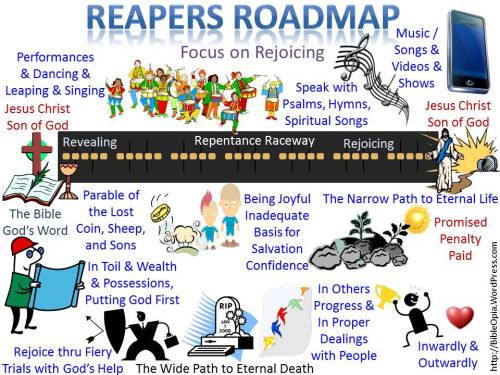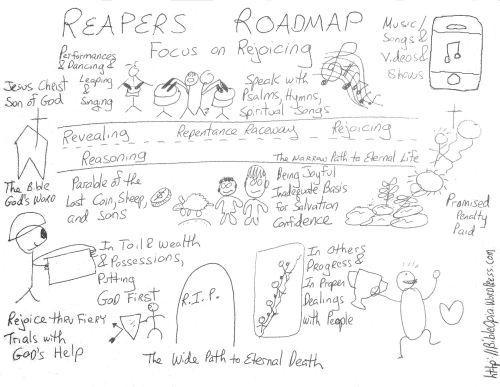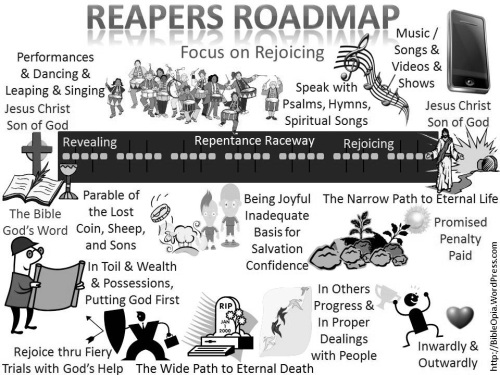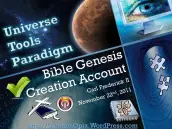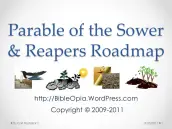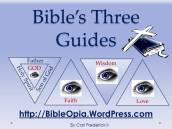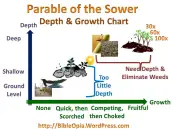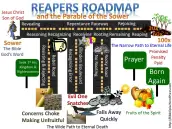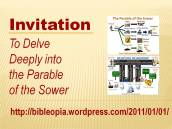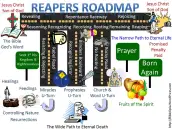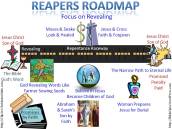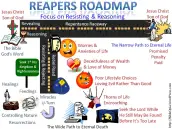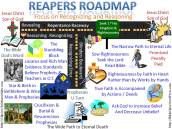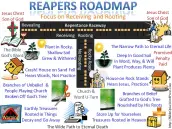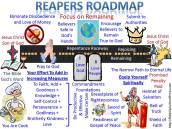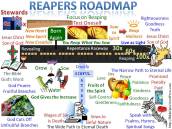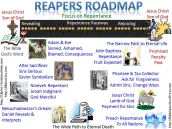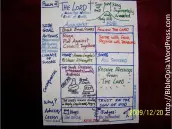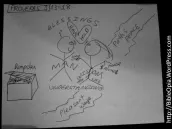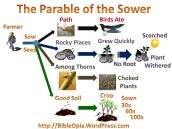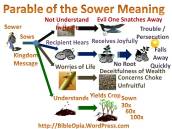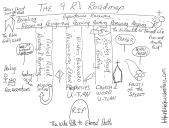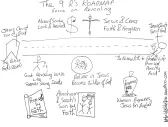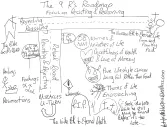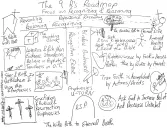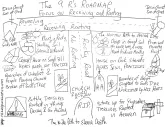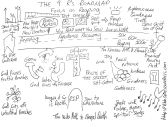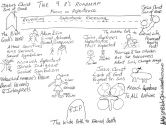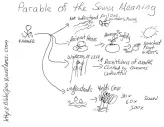
Review and then Focus on the Repentance Raceway
The Reapers Roadmap materials previously presented summarized how The Bible’s Gospel of John 1:10-13 and the “Parable of the Sower” found in Matthew 13:1-9 shows the way redemption typically happens, or regretfully fails to happen. That is, it shows how people come to faith in our Lord Jesus Christ, or choose another course both for their life on earth and more importantly for eternity.
John 1:9-13 (NIV): 9 The true light, which enlightens everyone, was coming into the world. 10 He was in the world, and the world was made through him, yet the world did not know him. 11 He came to his own, and his own people did not receive him. 12 But to all who did receive him, who believed in his name, he gave the right to become children of God, 13 who were born, not of blood nor of the will of the flesh nor of the will of man, but of God.
God reveals his word and ways so people have the chance to learn more and get to know God better by applying their reason and strength. God presents his message both to Jews and Gentiles. Today, God through his word and the Holy Spirit calls to those who attend Christian Services and who hear God’s word elsewhere along life’s paths. In the “Parable of the Sower” this is like dropping seeds of God’s word along the path, as illustrated in the Bible in Matthew 13:1-9.
Parable of the Sower: Matthew 13: 1-9 (NIV): 1 That same day Jesus went out of the house and sat by the lake. 2 Such large crowds gathered around him that he got into a boat and sat in it, while all the people stood on the shore. 3 Then he told them many things in parables, saying: “A farmer went out to sow his seed. 4 As he was scattering the seed, some fell along the path, and the birds came and ate it up. 5 Some fell on rocky places, where it did not have much soil. It sprang up quickly, because the soil was shallow. 6 But when the sun came up, the plants were scorched, and they withered because they had no root. 7 Other seed fell among thorns, which grew up and choked the plants. 8 Still other seed fell on good soil, where it produced a crop—a hundred, sixty or thirty times what was sown. 9 He who has ears, let him hear.“
Focus on the Repentance Raceway
Adam & Eve
While repentance is central to coming to God, we people often exhibit a contrary tendency towards blame and self-righteousness rather than repentance. Consider how Adam and Eve responded after their first disobedient act of rebellion, where they violated God’s commands, his trust, and their relationship with him. When caught, Adam and Eve reacted by blaming rather than taking responsibility and repenting. Adam blamed Eve. Eve blamed the serpent. Today people blame society, parents, family, friends, enemies, and others for their behavior. Even when all these are contributors, ultimately we are responsible for ourselves, and must decide to repent and ask for God’s forgiveness and assistance to start making better decisions.
Genesis 3:8-13 (ESV): 8 And they heard the sound of the LORD God walking in the garden in the cool of the day, and the man and his wife hid themselves from the presence of the LORD God among the trees of the garden. 9 But the LORD God called to the man and said to him, “Where are you?” 10 And he said, “I heard the sound of you in the garden, and I was afraid,because I was naked, and I hid myself.” 11He said, “Who told you that you were naked? Have you eaten of the tree of which I commanded you not to eat?” 12 The man said, “The woman whom you gave to be with me, she gave me fruit of the tree, and I ate.” 13 Then the LORD God said to the woman, “What is this that you have done?” The woman said, “The serpent deceived me, and I ate.”
Altar Sacrifices
One reason God instituted sacrifices is to remind people of how serious their sins are, so it makes sense that God still expects those who offer sacrifices to God to still listen and to obey God. While the blood of sacrifices was required for forgiveness of sins and to purify earthly symbols of heavenly objects, the higher purposes points to the Lamb of God, Jesus Christ, who was to be offered as the sacrifice for forgiveness of sins for all who believe and follow him.
1 Samuel 15:22 (ESV) 22 And Samuel said, “Has the LORD as great delight in burnt offerings and sacrifices, as in obeying the voice of the LORD? Behold, to obey is better than sacrifice, and to listen than the fat of rams.”
Leviticus 17:11 (ESV): 11 For the life of the flesh is in the blood, and I have given it for you on the altar to make atonement for your souls, for it is the blood that makes atonement by the life.
Hebrews 9:21-23 (ESV): 21 And in the same way he sprinkled with the blood both the tent and all the vessels used in worship. 22 Indeed, under the law almost everything is purified with blood, and without the shedding of blood there is no forgiveness of sins. 23 Thus it was necessary for the copies of the heavenly things to be purified with these rites, but the heavenly things themselves with better sacrifices than these.
Jonah and Nineveh
The Lord God forgave Nineveh’s people when they believed Jonah’s message from God and repented of their sins. Jonah was disappointed because what he prophesied at God’s direction did not come to pass. It’s also possible Jonah was disappointed because God spared his peoples’ enemies. God recognized Nineveh people’s repentant hearts and rewarded them with his mercy. This pattern of God rewarding belief and repentance with pardon and mercy is a pattern more fully revealed when Jesus’ comes and instructs his followers on righteousness.
Jonah 3:10 (ESV): 10 When God saw what they did, how they turned from their evil way, God relented of the disaster that he had said he would do to them, and he did not do it.
Jonah 4:1-4 (ESV): 1 But it displeased Jonah exceedingly, and he was angry. 2 And he prayed to the LORD and said, “O LORD, is not this what I said when I was yet in my country? That is why I made haste to flee to Tarshish; for I knew that you are a gracious God and merciful, slow to anger and abounding in steadfast love, and relenting from disaster. 3 Therefore now, O LORD, please take my life from me, for it is better for me to die than to live.” 4 And the LORD said, “Do you do well to be angry?”
Nebuchadnezzar’s Dream
Great King Nebuchadnezzar had a dream that greatly troubled him. To ensure a proper dream revelation was provided, the King insisted the wise men reveal both the dream and it’s interpretation, and threatened to execute all the wise men if they were unable to do so. God revealed the dream and its’ interpretation to Daniel, who told the dream and shared its’ interpretation with King Nebuchadnezzar.
Daniel 2:31-36 (ESV): 31 “You saw, O king, and behold, a great image. This image, mighty and of exceeding brightness, stood before you, and its appearance was frightening. 32 The head of this image was of fine gold, its chest and arms of silver, its middle and thighs of bronze, 33 its legs of iron, its feet partly of iron and partly of clay. 34As you looked, a stone was cut out by no human hand, and it struck the image on its feet of iron and clay, andbroke them in pieces. 35 Then the iron, the clay, the bronze, the silver, and the gold, all together were broken in pieces, and became like the chaff of the summer threshing floors; and the wind carried them away, so that not a trace of them could be found. But the stone that struck the image became a great mountain and filled the whole earth. 36 “This was the dream. Now we will tell the king its interpretation.
Daniel 2:37-45 (ESV): 37 You, O king, the king of kings, to whom the God of heaven has given the kingdom, the power, and the might, and the glory, 38 and into whose hand he has given, wherever they dwell, the children of man, the beasts of the field, and the birds of the heavens, making you rule over them all—you are the head of gold. 39 Another kingdom inferior to you shall arise after you, and yet a third kingdom of bronze, which shall rule over all the earth. 40 And there shall be a fourth kingdom, strong as iron, because iron breaks to pieces and shatters all things. And like iron that crushes, it shall break and crush all these. 41 And as you saw the feet and toes, partly of potter’s clay and partly of iron, it shall be a divided kingdom, but some of the firmness of iron shall be in it, just as you saw iron mixed with the soft clay. 42 And as the toes of the feet were partly iron and partly clay, so the kingdom shall be partly strong and partly brittle. 43 As you saw the iron mixed with soft clay, so they will mix with one another in marriage, but they will not hold together, just as iron does not mix with clay. 44 And in the days of those kings the God of heaven will set up a kingdom that shall never be destroyed, nor shall the kingdom be left to another people. It shall break in pieces all these kingdoms and bring them to an end, and it shall stand forever, 45 just as you saw that a stone was cut from a mountain by no human hand, and that it broke in pieces the iron, the bronze, the clay, the silver, and the gold. A great God has made known to the king what shall be after this. The dream is certain, and its interpretation sure.”
King Nebuchadnezzar’s dream prophesied about God’s Kingdom to come through the Son of God, Jesus Christ. God’s Kingdom is not an earthly Kingdom where people war and fight for it. It is a heavenly Kingdom, where entry is prefaced by seeking the Kingdom of God and God’s righteousness, which Jesus Christ reveals. To come to know Jesus is to imitate him and his true followers, knowing God’s Kingdom is often opposed by earthly powers. As King Nebuchadnezzars’ dream revealed, the certainty of God’s Kingdom eternal dominance is assured. Those who follow Jesus Christ, the Savior, the Messiah, the ultimate King of Kings and Lord of Lords are resting on a firm foundation. That firm foundation is the solid rock, the stone God the Father set in place, stands forever.
John the Baptist
As prophesied by Isaiah the Prophet, John the Baptist prepared the way for Jesus Christ’s coming, by making a straight path of repentance for God’s people to follow.
Mark 1:1-5 (NIV): 1 The beginning of the gospel about Jesus Christ, the Son of God. 2 It is written in Isaiah the prophet:
“I will send my messenger ahead of you, who will prepare your way”— 3 “a voice of one calling in the desert,
‘Prepare the way for the Lord, make straight paths for him.’ “
4 And so John came, baptizing in the desert region and preaching a baptism of repentance for the forgiveness of sins. 5 The whole Judean countryside and all the people of Jerusalem went out to him. Confessing their sins, they were baptized by him in the Jordan River
Many people hear the Word of God, recognize Jesus Christ for who he is, acknowledge their need to repent, and do so. Sorry for sinful wrongs they’ve committed previously, they focus on learning more about God, doing right now and in the future, and even make amends for their past too in certain circumstances. This sincere response mirrors what John the Baptizer expected when he called people to repent.
Matthew 3:10-12 (NIV): 10 The ax is already at the root of the trees, and every tree that does not produce good fruit will be cut down and thrown into the fire. 11 “I baptize you with water for repentance. But after me will come one who is more powerful than I, whose sandals I am not fit to carry. He will baptize you with the Holy Spirit and with fire. 12 His winnowing fork is in his hand, and he will clear his threshing floor, gathering his wheat into the barn and burning up the chaff with unquenchable fire.”
John the Baptist called several religious teachers to true repentance, since they appeared externally righteous, yet their internal hearts were far from God. Repentance involves changes to heart, mind, and actions. Repentance requires changing our lifestyles, how we relate to others, and what we think. John the Baptist challenged religious leaders to evidence their repentance was true by their actions.
Matthew 3:7-9 (NIV): 7 But when he saw many of the Pharisees and Sadducees coming to where he was baptizing, he said to them: “You brood of vipers! Who warned you to flee from the coming wrath? 8 Produce fruit in keeping with repentance. 9 And do not think you can say to yourselves, ‘We have Abraham as our father.’ I tell you that out of these stones God can raise up children for Abraham.
Parable of the Pharisee & Tax Collector
The Parable of the Pharisee and Tax Collector instructs that a repentant heart is one God expects in prayer and when reaching out to him, while also informing that to be self-righteous, full of pride, and unrepentant, is sinful.
Luke 18:9-14 (NIV): 9 To some who were confident of their own righteousness and looked down on everybody else, Jesus told this parable: 10 “Two men went up to the temple to pray, one a Pharisee and the other a tax collector. 11 The Pharisee stood up and prayed about himself: ‘God, I thank you that I am not like other men—robbers, evildoers, adulterers—or even like this tax collector. 12 I fast twice a week and give a tenth of all I get.’ 13 “But the tax collector stood at a distance. He would not even look up to heaven, but beat his breast and said, ‘God, have mercy on me, a sinner.’ 14 “I tell you that this man, rather than the other, went home justified before God. For everyone who exalts himself will be humbled, and he who humbles himself will be exalted.”
John’s letter likewise reinforces the importance to repent of our sins, and highlights the failure to do is evidence to convict us.
1 John 1:8-10 (ESV): 8 If we say we have no sin, we deceive ourselves, and the truth is not in us. 9 If we confess our sins, he is faithful and just to forgive us our sins and to cleanse us from all unrighteousness. 10 If we say we have not sinned, we make him a liar, and his word is not in us.
How do you know what to repent for? You learn more about God, and our need for repentance, by reading the Bible, focusing upon Jesus’ life, and joining a community of believers, if one is available to you. What is it like to follow Jesus with a willingness to repent for your wrong-doings? As Jesus’ follower, you continue to find more sins to eliminate from your life, knowing you’ve sinned, as you learn more about God’s righteous expectations.
When you follow Jesus, you’ll find several behaviors to eliminate. You’ll enjoy many successes doing that, despite setbacks causing you to reflect and redraw boundaries to appropriately address your own tendencies. Reflecting further upon God’s word, you’ll learn what you communicate verbally, non-verbally, and via writing is of key importance. Praying for help and focusing upon the Lord’s words, you’ll continue to enjoy many successes, as you implement and observe improvements in your own language use.
Delving deeper into God’s words, you’ll see self-control is expected too, whether its’ self-control in expressing your emotions, satiating your appetites, or other varieties. Whether it’s this challenge or another area to improve, several years will pass as you face these challenges. With God’s help, and the support network of many believers imitating Christ, you are able to conquer these challenge too. You’ll understand your thoughts and desires underlie sins which lead you astray at times. Observing your thoughts and watching your desires closely, you’ll come to know again how sinful you are, and how needful it is to repent.
You’ll find many things worldly people value, such as wealth and materialism, you also value too highly. You’ll ask God to help you direct your focus upon what is right and holy, leading to improvements in your thinking, reasoning, and priorities. You realize sin is more than just what we do that is wrong, but is also when you omitted doing the right you ought to do too, and so you’ll repent of that too.
You’ll realize God’s expects us to love and care for others, and recognize you’ve missed many opportunities to do so, and now aim to be more proactive to find and follow-up on chances to show others love and kindness. The more you improve, the more you’ll learn there is to improve. As you repent, you’ll admit your ultimate responsibility for your sins. Your recognition of God’s holiness leads you to seek to soak up Jesus’ life and words to permeate your soul, so you’ll be prepared to succeed, and prepared to keep going despite temporary failures and setbacks.
You’ll search for ways to share what you’ve learned and how you’ve been successful in overcoming many of life’s challenges with the support of God’s words and his people so others receive help they need too, like you did. You’ll realize many others are also seeking to help those in need too, yet you were ignorant of what they’ve overcome. This realization leads you to pursue opportunities to be a match maker, between those with needs for help, and those who know how to address those needs, with help from God’s word and their own life’s experience.
You’ll discover being wise will help you be more effective when helping others, so you’ll advance your knowledge in many areas. You’ll be informed there is worldly wisdom and heavenly wisdom that is even higher, so you are careful to use any worldly wisdom as tools to teach the higher wisdom of God. You’ll align your assistance with those already forming collective groups to helps others more effectively. You’ll explore creative thinking to address needs previously looking insurmountable in your pursuit to bring hope and joy into people’s lives.
Perhaps you as a follower of Christ will like the rest of us only fulfill a portion of the repentance and redirection in our lives before we return to the dust of the earth from which we came. Perhaps you’ll live a full life, doing the above and much more, as you follow Jesus Christ. Perhaps you’ll tackle several challenges at simultaneously. The important part is turning your life over to Jesus Christ, so you begin and continue to walk the narrow path to life until God the Father determines it’s time to depart this world.
Jesus Christ the Lamb of God
Sacrifices of animals were a foreshadow and copy of the sacrifice Jesus Christ made as a perfect Lamb for the world’s sins when Jesus was crucified on the cross and died for our sins. Our part is to believe, be repentant, and decide to seek and follow God, whom Jesus Christ revealed.
John 3:16-17 (ESV): 16 “For God so loved the world,that he gave his only Son, that whoever believes in him should not perish but have eternal life. 17 For God did not send his Son into the world to condemn the world, but in order that the world might be saved through him.
1 Corinthians 5:7-8 (ESV): 7 Cleanse out the old leaven that you may be a new lump, as you really are unleavened. For Christ, our Passover lamb, has been sacrificed. 8 Let us therefore celebrate the festival, not with the old leaven, the leaven of malice and evil, but with the unleavened bread of sincerity and truth.
Matthew 26:1-4 (ESV): 1 When Jesus had finished all these sayings, he said to his disciples, 2 “You know that after two days the Passover is coming, and the Son of Man will be delivered up to be crucified.” 3 Then the chief priests and the elders of the people gathered in the palace of the high priest, whose name was Caiaphas, 4 and plotted together in order to arrest Jesus by stealth and kill him.
Preach Repentance to All Nations
Repentance is foundational to Jesus’ ministry and to his disciples, who seek people who will acknowledge their sinful condition, confess their sins, and turn towards God in truth and action.
Luke 5:31-32 (NIV): 31 Jesus answered them, “It is not the healthy who need a doctor, but the sick. 32 I have not come to call the righteous, but sinners to repentance.”
Acts 20:21 (NIV): I have declared to both Jews and Greeks that they must turn to God in repentance and have faith in our Lord Jesus.
Acts 26:20 (NIV): First to those in Damascus, then to those in Jerusalem and in all Judea, and to the Gentiles also, I preached that they should repent and turn to God and prove their repentance by their deeds.
God is patient and suffers many evil doers who appear successful in what they do. God permits this, as part of his plan to bring as many people as possible to embrace repentance. Despite this, several people will choose the wide path of the unrepentant, to their own eternal punishment.
2 Peter 3:8-9 (NIV): 8 But do not forget this one thing, dear friends: With the Lord a day is like a thousand years, and a thousand years are like a day. 9 The Lord is not slow in keeping his promise, as some understand slowness. He is patient with you, not wanting anyone to perish, but everyone to come to repentance
Many people who do wrong insincerely claim they are sorry. Several are primarily only sorry they were caught and were not sorry for their actions. This is an ungodly sorrow. Godly sorrow fuels sincere repentance.
2 Corinthians 7:9-11 (NIV): 9 yet now I am happy, not because you were made sorry, but because your sorrow led you to repentance. For you became sorrowful as God intended and so were not harmed in any way by us. 10 Godly sorrow brings repentance that leads to salvation and leaves no regret, but worldly sorrow brings death. 11 See what this godly sorrow has produced in you: what earnestness, what eagerness to clear yourselves, what indignation, what alarm, what longing, what concern, what readiness to see justice done. At every point you have proved yourselves to be innocent in this matter
Disciples in the faith are called to pursue God’s holy righteousness in their lives, avoiding unproductive arguments, and being kind to everyone.
2 Timothy 2:20-26 (NIV): 20 In a large house there are articles not only of gold and silver, but also of wood and clay; some are for noble purposes and some for ignoble. 21 If a man cleanses himself from the latter, he will be an instrument for noble purposes, made holy, useful to the Master and prepared to do any good work. 22 Flee the evil desires of youth, and pursue righteousness, faith, love and peace, along with those who call on the Lord out of a pure heart. 23 Don’t have anything to do with foolish and stupid arguments, because you know they produce quarrels. 24 And the Lord’s servant must not quarrel; instead, he must be kind to everyone, able to teach, not resentful. 25 Those who oppose him he must gently instruct, in the hope that God will grant them repentance leading them to a knowledge of the truth, 26 and that they will come to their senses and escape from the trap of the devil, who has taken them captive to do his will.
Life’s choice is between repentance and stubbornness, between seeking God’s mercy versus rejecting God’s mercy in favor of God’s just wrath, whether received on Earth now, or later for eternity.
Romans 2:20-26 (NIV): 4 Or do you show contempt for the riches of his kindness, tolerance and patience, not realizing that God’s kindness leads you toward repentance? 5 But because of your stubbornness and your unrepentant heart, you are storing up wrath against yourself for the day of God’s wrath, when his righteous judgment will be revealed. 6 God “will give to each person according to what he has done.” 7 To those who by persistence in doing good seek glory, honor and immortality, he will give eternal life. 8 But for those who are self-seeking and who reject the truth and follow evil, there will be wrath and anger.
As Jesus’ followers preach the Kingdom of God, the need to seek God’s righteousness, and the critical necessity of repentance to all nations, they can be confident in God’s eventual victory, thanks to the Prophesy of Daniel embedded in King Nebuchadnezzar’s Dream.
Daniel 2:37- (ESV): 44 And in the days of those kings the God of heaven will set up a kingdom that shall never be destroyed, nor shall the kingdom be left to another people. It shall break in pieces all these kingdoms and bring them to an end, and it shall stand forever, 45 just as you saw that a stone was cut from a mountain by no human hand, and that it broke in pieces the iron, the bronze, the clay, the silver, and the gold. A great God has made known to the king what shall be after this. The dream is certain, and its interpretation sure.”
Key Points: Repentance Raceway
- Adam and Eve illustrates people’s tendency to ________ another to avoid their responsibility, rather than ___________ when feeling ________ as a result of sinning, in a vain attempt to avoid deserved ___________.
- Altar sacrifices remind us that sins are ________ and foreshadow Jesus as the _______ being offered to God as payment for our sins.
- Just like God was _________ after Nineveh was _____________, God expects all people to be ___________ too.
- God revealed to Daniel King Nebuchadnezzar’s ___________ and its’ _____________, which prophesies Jesus’ Kingdom to fill the whole _________.
- John baptizes people with a baptism of ___________, expecting the ________ of repentance as proof of sincerity deep in the heart. Likewise Jesus’ disciples declared all must repent, turn to God, and ______ their repentance by their ________.
- The Parable of the Pharisee & Tax Collector shows God ___________ the sincerely repentant, yet withholds __________ from the self-righteous before God, who are full of pride, which is sinful.
- Godly _______ fuels sincere repentance.
- Followers of Jesus continue to find more _______ to eliminate from their life and more ________ to do in their life, as they continue to learn and apply more about God’s __________ expectations.
- Jesus Christ is known as the ______ of God because he offered himself on the cross as the _______ for the sins of true believers.
- The Great Commission involves Jesus Christ instructing followers to Preaching the Gospel of ____________ to make disciples of all nations, a mission whose success is ________, thanks to the interpretation of King Nebuchadnezzar’s Dream.
Discussion Questions: Repentance Raceway
(1) What did you learn from Adam & Eve’s example about our innate tendencies towards repentance?
(2) Considering times you and others have done wrong, why is God patient with evil doers?
(3) What does The Parable of the Pharisee and Tax Collector teach us regarding the importance of repentance and the folly of self-deceptive self-righteousness, pomp, position, and appearances?
(4) What does the history of Jonah and Nineveh show us about God’s character, righteousness, and generosity?
(5) Why are there no altar sacrifices in Christianity? What does God value more than altar sacrifices? When was the ultimate altar sacrifice made for all who’d repent and believe?
(6) At a high-level, of what types of thoughts, actions, communications, and omissions do you need to repent?
(7) Why did John the Baptist focus upon preaching repentance? How central is repentance to God’s worldwide outreach?
(8) How do you know Jesus’ Gospel outreach will be successful in reaching people in all nations in this world despite opposition? How can you contribute to this mission over the course of your lifetime? What progress have you made?
(9) What advantage is gained from applying wisdom, learning from others, and collectively working together on God’s mission field?
Next Steps
View the Parable of the Sower Slideshare Presentation.
You can also directly view the Parable of the Sower presentation at the Slideshare link http://www.slideshare.net/creationary/parable-of-the-sower-and-reapers-roadmap-slide-share
Continue your studies on the Parable of the Sower:
https://bibleopia.wordpress.com/2011/01/01/invitation-to-delve-deeply-into-the-parable-of-the-sower
Hand Drawn Repentance Raceway Roadmap

Key Points: Repentance Raceway: Answers
- Adam and Eve illustrates people’s tendency to blame another to avoid their responsibility, rather than repent when feeling ashamed as a result of sinning, in a vain attempt to avoid deserved consequences / punishment.
- Altar sacrifices remind us that sins are serious and foreshadow Jesus as the Lamb being offered to God as payment for our sins.
- Just like God was merciful after Nineveh was repentant , God expects all people to be repentant too.
- God revealed to Daniel King Nebuchadnezzar’s dream and its’ interpretation , which prophesies Jesus’ Kingdom to fill the whole Earth / world .
- John baptizes people with a baptism of repentance , expecting the fruit of repentance as proof of sincerity deep in the heart. Likewise Jesus’ disciples declared all must repent, turn to God, and prove their repentance by their deeds / works .
- The Parable of the Pharisee & Tax Collector shows God forgives the sincerely repentant, yet withholds forgiveness from the self-righteous before God, who are full of pride, which is sinful.
- Godly sorrow fuels sincere repentance.
- Followers of Jesus continue to find more sins to eliminate from their life and good to do in their life, as they continue to learn and apply more about God’s righteous expectations.
- Jesus Christ is known as the Lamb of God because he offered himself on the cross as the payment / propitiation for the sins of true believers.
- The Great Commission involves Jesus Christ instructing followers to Preaching the Gospel of repentance to make disciples of all nations, a mission whose success is certain / sure / assured , thanks to the interpretation of King Nebuchadnezzar’s Dream
The Parable of the Pharisee and the Tax Collector
Read Full Post »




